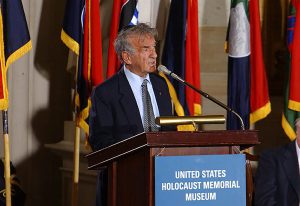The Elie Wiesel Foundation for Humanity has named the University of South Florida (USF) and the Florida Holocaust Museum as the permanent homes of the papers and artifacts of Elie Wiesel, a Holocaust survivor who became an esteemed humanitarian, writer, and recipient of the Nobel Peace Prize.

Wiesel’s physical and digitized papers, including correspondence with world leaders, unfinished manuscripts, photographs, and video and audio recordings will be housed and cataloged at the Nelson Poynter Memorial Library’s Special Collections Department on the USF St. Petersburg campus. Artifacts from his collection, including his Nobel Prize, the contents of his personal office and library, and a variety of artworks will become a cornerstone of the permanent exhibition at the museum, which is located in downtown St. Petersburg.
“The USF Libraries look forward to ensuring these materials and the stories they represent are shared through ongoing teaching and research initiatives, securing opportunities for scholars and students to both learn and create new knowledge from Elie Wiesel’s invaluable archive,” says Kristina Keogh, campus dean of the Nelson Poynter Memorial Library.

With this trove of historical documents and research materials, USF plans to create the Elie Wiesel Center for Humanitarian Ethics. The new center will feature an historical archive and searchable database, allowing researchers and educators to delve deeper into the Holocaust and apply Wiesel’s teachings to contemporary genocides, crimes against humanity, and assaults on human rights.
“We are honored to work together with the Florida Holocaust Museum to create a hub of humanitarian activity and education worthy of such an extraordinary man,” says Rhea Law, president of the University of South Florida. “Together, we will build a center of intellectual activity that reflects Wiesel’s own life and learning. We are grateful for the trust placed in our university and stand ready to turn this vision into a reality.”
The donation from the Elie Wiesel Foundation will be felt across USF academics and research, enriching curriculum, framing programs and exhibits, and generating interdisciplinary research.
“There are many throughout USF whose work touches on and overlaps with the life and teachings of Elie Wiesel,” says Thomas Smith, vice provost of academic affairs at USF St. Petersburg and a Florida Holocaust Museum board member. “We envision the center bringing together faculty from political science, philosophy, anthropology, criminology, and other fields to develop major research initiatives around humanitarian ethics, bring in national grants and attract philanthropic support and talent to the university.”
Becoming the permanent home of Elie Wiesel’s collection further strengthens the long partnership between USF and the Florida Holocaust Museum. “The USF Libraries are honored to work with the Florida Holocaust Museum to preserve and provide access to the invaluable research materials in the Elie Wiesel Collection and Archive, adds USF Libraries’ Keogh.
“By joining forces, we aim to utilize our expertise in community engagement, collaboration, and accessibility to enable scholars and students to develop innovative insights from these priceless and exceptional resources.”